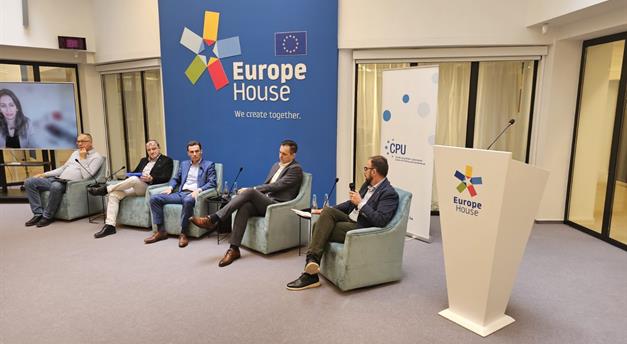
The Centre for Policy and Governance (CPU) organized a roundtable discussion entitled "Carbon Pricing in Bosnia and Herzegovina - Implications, Challenges, and Opportunities" on February 22, 2024, at Europe House in Sarajevo. The event brought together representatives of the government, key international organizations, industry stakeholders, academic community, and civil society to initiate a crucial debate on the implications, challenges, and opportunities related to carbon prices, as well as capacity building and awareness on this issue.
The European Carbon Border Adjustment Mechanism (CBAM) is being introduced as a fee/tariff for carbon emissions in the production of carbon-intensive products (iron and steel, cement, fertilizers, aluminum, electricity, and hydrogen). It will be applicable upon import into the EU from 2026.
According to the Regulatory Commission for Electric Power (DERK), in 2022, 64% of electric energy in Bosnia and Herzegovina was produced from coal-fired power plants. Key sectors such as electricity, cement, iron and steel, aluminum, and artificial fertilizers constitute nearly a third of Bosnia and Herzegovina's exports, with exports to the EU accounting for about 10% of GDP in 2022. According to the IMF, the decline in exports from affected industries in Bosnia and Herzegovina could range from 11% to 25%, depending on the level of carbon taxes, amounting to approximately 1.1% to 2.5% of GDP.
In line with the Decarbonization Roadmap for Bosnia and Herzegovina, in collaboration with other countries in the region, the introduction of a CO2 price through the establishment of an Emission Trading System (ETS) is planned by 2026 to avoid the effects of CBAM and generate domestic revenues, instead of EU revenues, to support the transition to renewable energy and reduce CO2 emissions in relevant sectors. The implementation of both CBAM and the introduction of ETS will significantly impact various sectors in Bosnia and Herzegovina.
Panelists participating in this event presented different perspectives and contributed to a crucial discussion on the future of the energy sector in Bosnia and Herzegovina.
Branka Knežević, Head of the Department for Primary Energy and Policy, Sector for Energy at the Ministry of Foreign Trade and Economic Relations of BiH, and Halko Balavac, Assistant Minister for the Energy Sector at the Federal Ministry of Energy, Mining, and Industry, presented the activities of their ministries in preparation for the introduction of ETS. Stefano Ellero, Head of Cooperation at the EU Delegation in BiH, introduced the ETS system as a key fiscal instrument to combat climate change, existing in the EU since 2005. Alpa Shah, Economist in the Fiscal Affairs Department of the International Monetary Fund, presented the economic, social, and environmental implications of this instrument, while Armin Hodžić, Director of the Energy Sector at the Chamber of Commerce of the Federation of Bosnia and Herzegovina, and Azrudin Husika, Professor at the Faculty of Mechanical Engineering, University of Sarajevo, discussed the challenges that companies in Bosnia and Herzegovina face in reporting under CBAM, which came into effect in October 2023.
The main conclusion of this discussion emphasizes that adaptation and transformation are inevitable, and timely decisions by relevant authorities in Bosnia and Herzegovina, based on a broader expert and societal debate on the main elements of this design, are crucial. A detailed analysis of various aspects of the changes is necessary, given that many will be affected by them.
The roundtable was organized as part of the "Green Agenda Club" project, supported by a grant from the Open Society Fund Bosnia and Herzegovina.

